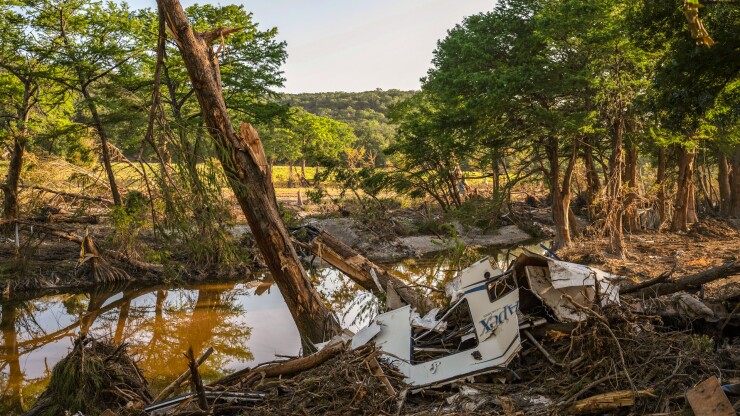
Responding to recent devastating floods in Texas is a top priority for a special session of the legislature that began Monday but lawmakers are also making a renewed effort to restrain local taxes and bond issues.
Massive flooding along the Guadalupe River in the state's Hill Country over the July 4 holiday weekend claimed 135 lives as of Thursday and caused billions of dollars in damage. The disaster highlighted the need for proper disclosure of such risks to potential bond investors.
Gov. Greg Abbott listed flood warning systems, emergency communications, funding to cover Hill Country response and recovery costs, and natural disaster preparation among agenda items for the 30-day special session.
The heads of the Republican-controlled House and Senate created select committees in their chambers that will start holding hearings related to the flood this week.
Abbott also wants legislation to limit local property taxes after lawmakers passed $51 billion in state-funded tax relief for the fiscal 2026-27 biennium.
While measures seeking to rein in local taxes and bonds largely
They would
Another
These latest attempts targeting local government and school district finances come as the growing state must deal with infrastructure needs and extreme weather events, according to Martin Luby, director of the Center on Municipal Capital Markets at the University of Texas at Austin.
"Whether it's mitigation efforts or adaptation efforts, restricting the ability to issue debt can really shoot these local communities in the foot in terms of managing these issues," he said.
A commitment to build infrastructure to deal with severe weather events will be "super expensive" and would involve bond financing, according to Luby.
"I'm sure there'd be other dollars in play as well, in terms of monies, perhaps from the federal government, loans, etc.," he said. "But, I don't know how you get around the use of bonds, especially given the fact that they're a cheaper form of financing with tax exemption that deal with this sort of capital investment."
The Texas Water Development Board's
Ahead of the special session, Kelly Hancock, the state's acting comptroller, announced only $3.1 billion is available for general-purpose spending.

Randall Erben, adjunct professor at the University of Texas at Austin Law School, said the flood response, as well as a contentious plan for congressional redistricting and state regulation of hemp-derived projects will take up "all the oxygen" in the special session.
"I just think beyond that, there's really not going to be time or room on the agenda, or even in the bandwidth of the legislators, to do much more than that," he said.
The flooding caused $18 billion to $22 billion of damage and economic losses, according to
"The damage, impacts on future tourism, cost of search and recovery efforts, extensive cleanup that will be needed, as well as insurance claims after this catastrophic flash flood, will have long-lasting economic impacts in the Hill Country region of Texas," Chief Meteorologist Jonathan Porter said in a statement.
The disaster raised concerns about a lack of disclosure of the risk on the part of affected local governments and recent bond issuers Kerr County and Kerrville Public Utility Board.
"The risk of severe flooding, which 1) was known and modeled in regional flood planning documents; 2) a public concern for several years because of the lack of sufficient warning systems; and 3) had happened previously, was not meaningfully disclosed in either issuer's offering documents," a report last week by Municipal Market Analytics said.
Following the June 25 sale of $73.4 million of insured power supply revenue bonds, the Kerrville board posted
Kerr County
Luby said risk disclosure is a problem everywhere and not just in Texas.
"(Issuers) need to talk about: 'Yes, we have these risks, and this is what we have done to date to mitigate them or to adapt to them, and this is what we're planning to do,'" he said, adding that more information has to be provided to allow investors to make a reasonable investment decision.
Kerr County commissioners
County Commissioners Court Judge Rob Kelly said the higher rate is under consideration due to traditionally slow FEMA reimbursements and a drop in appraised property values that could exceed $240 million.
While the move is allowed under current Texas law for federally or state declared disaster areas,





